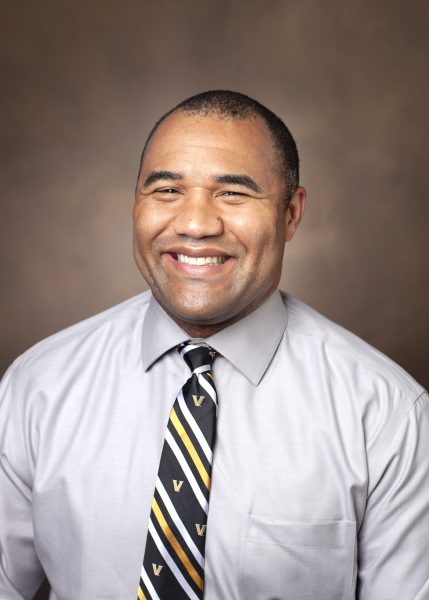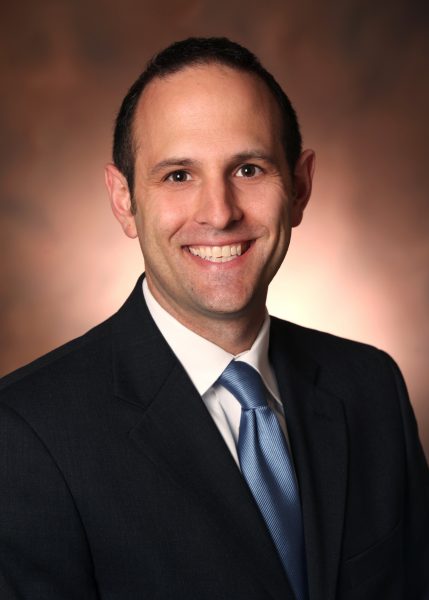
For Dr. Colin Orr, assistant professor of pediatrics in Vanderbilt University’s School of Medicine and a general pediatrician and health services researcher at Vanderbilt University Medical Center, being able to contribute to medical literature and patient care is the culmination of years of dedication and hard work.
“It’s a lot to think about—investing this much time and being so close to realizing this dream of improving children’s health,” Orr said.
Today, Orr is preparing to work with communities in Middle Tennessee through a randomized trial at Vanderbilt Children’s Primary Care clinic to test his hypothesis about prevention of chronic disease.
The premise is that the first two years of a child’s life are crucial in preventing long-term obesity and cardiovascular disease, and that families in certain socio-demographics are at higher risk.
The trial, which is funded by a K23 Career Development Award from the National Institute of Diabetes and Digestive and Kidney Diseases, is expected to begin this summer and will assign peer-parent coaches to families to determine whether their having support to navigate the medical system and other challenges means their children will be healthier.
“We’re interested in testing whether a peer can help families to gain confidence and address other factors that influence health,” Orr said. “And how can we then think about incorporating these people into our primary care system?”
Orr says the idea was inspired by his own clinical interactions.
After receiving a bachelor of science in biology from Washington University in St. Louis in 2009, Orr earned his medical degree from Columbia University in 2013 and completed his pediatric residency at Cincinnati Children’s Hospital Medical Center in 2016. In his clinical work, he noticed that some of his patients were consistently stymied by roadblocks involving education, nutrition and caregiving.
“I really valued connections with families, but I realized there were a lot of drivers of health outside of clinicals and 15-minute appointments,” Orr said. “I wanted the knowledge to augment my clinical skills and think about how to improve health care delivery to patients—especially those who face barriers—so that I could better help families that I see weekly.”
He proceeded to earn a master’s from the Gillings School of Public Health at the University of North Carolina–Chapel Hill in 2018 and accepted a position as an assistant and then associate professor of pediatrics at UNC. While there, he examined data obtained through The Greenlight Study, another NIH-funded research project that enrolled 865 parent-infant dyads. The results of the study were published in the journal Pediatrics.

Orr then worked with Dr. Bill Heerman. Heerman is the William K. Warren Foundation Chair in Medicine and associate professor of pediatrics and head of the Division of Academic General Pediatrics at VUMC, and he’s lead author on a follow-up study called Greenlight Plus. The results of the study, which were published in the Journal of the American Medical Association last year, showed that combining a series of text messages with traditional health behavior counseling made a positive contribution to preventing childhood obesity.
“Research is a process that has a long arc to it,” Orr said. “The Greenlight Study generated a lot of information and data that we looked at and analyzed and continue to think about and collaborate on.”
In 2024, Orr was offered the position at Vanderbilt, and he jumped at the chance to be part of the university and work more directly with Heerman.
“With the caliber of research at the university and Dr. Heerman’s history of supporting early career investigators, along with the chance to support communities in Middle Tennessee, I realized this was an opportunity I wouldn’t be able to pass up,” Orr said. “There’s a decades-long history of successful collaborations at Vanderbilt that has informed the way we think about the health of communities and children, and the opportunity to be involved with that continues to impress me.”
With Heerman as his mentor, Orr has focused on refining the science behind the forthcoming trial.
“In a true, scientific way, we want to understand what works and why, why something doesn’t work, and how we can improve the overall intervention,” Orr said.
Among the key questions he seeks to answer are whether successful peer interventions can happen in the busy and large practice area of pediatrics, if the study can recruit and retain more than 100 families, and, mainly, whether such intervention will ultimately be helpful.
“I am intrigued by the idea of using peers who are closer to a patient’s lived experience than providers, and who can occupy a role in health promotion that physicians may not be the best positioned to fill,” he said.
For Heerman, the opportunity to provide more support to patients is also a win.
“Even though we have known for a long time that healthy nutrition and physical activity matter to everyone, our country still lags behind—and is one of the worst—in improving nutrition and physical activity for kids,” Heerman said. “We need these innovative solutions in recalcitrant areas.”
For both physician-scientists, the trial is a testament to what sustained effort and strong partnerships can achieve.
“In terms of the collaborators and all the people who contributed to this work up until now, it is more than 30 people across multiple institutions at various stages of their careers that have allowed us to be at this moment,” Orr said.
“I hope to continue to work with mentors and the Vanderbilt Children’s Primary Care clinic and communities to figure out how to deliver care that influences the health of all children in the U.S., especially ones who might face barriers,” he added. “My hope is that one day the investment in this research will benefit families and children across the nation.”




